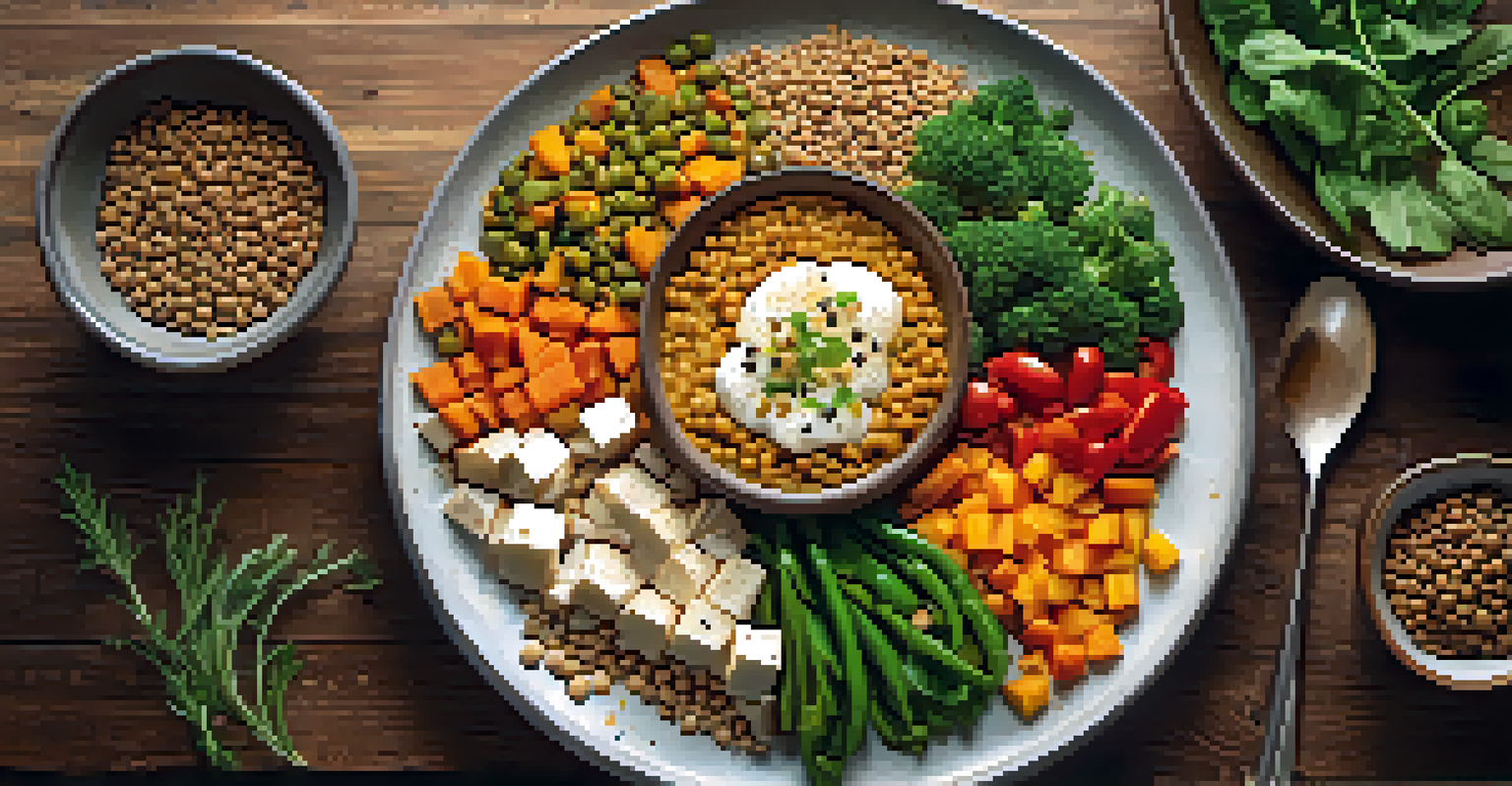Vegetarian Meal Planning for Athletes: Nutritional Insights

Understanding the Vegetarian Athlete's Nutritional Needs
Athletes have unique nutritional requirements, and for those following a vegetarian diet, understanding these needs is crucial. Proper fuel is essential for performance, recovery, and overall health. A well-planned vegetarian diet can provide all the necessary nutrients, but it takes a bit of knowledge and preparation.
Let food be thy medicine and medicine be thy food.
Key nutrients such as protein, iron, calcium, and vitamin B12 must be prioritized. For instance, protein can be sourced from lentils, chickpeas, and quinoa, while leafy greens can boost iron intake. Understanding where to find these nutrients helps ensure that vegetarian athletes are not missing out on anything vital for their training.
Planning meals ahead of time can alleviate the stress of figuring out what to eat on the go. By prepping meals, athletes can avoid poor food choices and maintain their energy levels. This ensures that vegetarian athletes remain at the top of their game.
Importance of Protein in a Vegetarian Diet
Protein is often a concern for athletes going vegetarian, but it’s entirely possible to meet protein needs with plant-based sources. Foods like tofu, tempeh, and seitan are excellent protein-rich options that can easily be incorporated into meals. Additionally, legumes and beans are not only high in protein but also provide essential fiber.

For those who struggle to get enough protein through food alone, considering a plant-based protein supplement can be beneficial. These supplements can help fill in the gaps, especially post-workout when muscle recovery is crucial. However, it's always best to prioritize whole food sources first.
Nutrient Focus for Vegetarian Athletes
Vegetarian athletes need to prioritize key nutrients like protein, iron, calcium, and vitamin B12 for optimal performance and recovery.
Aiming for a variety of protein sources ensures a complete amino acid profile. This means combining different types of proteins, such as rice with beans, which together provide all nine essential amino acids. Mixing up protein sources keeps meals interesting and nutritious.
Essential Vitamins and Minerals for Optimal Performance
Vitamins and minerals play a significant role in an athlete's performance, and vegetarians need to pay extra attention to certain nutrients. Vitamin B12, commonly found in animal products, is essential for energy production and can be obtained through fortified foods or supplements. Similarly, calcium and vitamin D are crucial for bone health and can be sourced from fortified plant milks and leafy greens.
The food you eat can either be the safest and most powerful form of medicine or the slowest form of poison.
Iron is another critical nutrient for athletes, as it helps transport oxygen in the blood. Vegetarians can boost their iron levels by consuming foods like lentils, spinach, and pumpkin seeds. Pairing these with vitamin C-rich foods, like oranges or bell peppers, can enhance iron absorption.
A well-rounded multivitamin may also be a good addition to a vegetarian athlete's routine. This can help cover any nutritional gaps and ensure they’re performing at their best, particularly during intense training periods.
Meal Planning Strategies for Busy Athletes
Busy athletes often struggle with meal planning, but a few strategies can make it easier. One effective approach is batch cooking, where large quantities of food are prepared at once and stored for the week ahead. This not only saves time but also ensures that nutritious meals are readily available after a workout.
Creating a weekly menu can also help streamline shopping and cooking. By planning meals in advance, athletes can ensure they have all the necessary ingredients and avoid last-minute unhealthy choices. This can involve simple dishes that can be quickly assembled, like grain bowls or stir-fries.
Effective Meal Planning Strategies
Meal planning techniques such as batch cooking and creating a weekly menu can help busy athletes maintain a nutritious diet.
Lastly, keeping healthy snacks on hand is vital for maintaining energy levels throughout the day. Options like mixed nuts, protein bars, or veggie sticks with hummus make for easy grab-and-go snacks that won’t derail a training schedule.
Hydration: The Overlooked Component of Performance
While nutrition is essential, hydration is often the unsung hero of athletic performance. Staying hydrated helps maintain energy levels, supports recovery, and prevents fatigue. As vegetarians tend to consume a lot of water-rich foods, like fruits and vegetables, they may think they’re covered, but it’s still crucial to drink enough fluids throughout the day.
Athletes should aim for a mix of water and electrolyte-rich drinks, especially during intense workouts. Coconut water or homemade electrolyte drinks can be great options to replenish lost minerals. Monitoring urine color can also be a simple way to gauge hydration levels.
It’s particularly important to hydrate before, during, and after exercising. A well-hydrated athlete can perform better, recover faster, and feel more refreshed. Incorporating hydration into the meal planning process can help athletes stay on track.
Building Balanced Vegetarian Meals: What to Include
When it comes to building balanced vegetarian meals, the key is to include a variety of food groups. A good rule of thumb is to fill half your plate with vegetables, one quarter with whole grains, and one quarter with protein sources. This approach ensures that meals are nutrient-dense and satisfying.
Incorporating healthy fats, like avocados or nuts, can also enhance the nutritional profile of meals. These fats help with the absorption of fat-soluble vitamins and provide long-lasting energy. Additionally, spices and herbs can add flavor without extra calories, making meals more enjoyable.
Hydration's Role in Performance
Staying adequately hydrated is essential for athletic performance, recovery, and overall energy levels, particularly for vegetarian athletes.
Experimenting with different cuisines can keep meal planning exciting. From Mediterranean chickpea salads to Indian lentil curries, there are countless vegetarian dishes that can cater to an athlete's needs while tantalizing the taste buds.
Listening to Your Body: Adjusting Your Diet as Needed
Every athlete's body is unique, and what works for one person may not work for another. It's important to listen to your body and adjust your diet based on how you feel and perform. If you notice fatigue or decreased performance, it might be time to reassess your meal planning.
Keeping a food journal can be a helpful practice, allowing athletes to track what they eat and how they feel during training. This can provide insights into which foods fuel performance best and which might be causing issues. Adjusting portion sizes or meal timing can also make a significant difference.

Ultimately, the goal is to find a balance that supports both performance and well-being. Consulting with a registered dietitian who specializes in sports nutrition can provide personalized guidance and help athletes optimize their vegetarian meal plans.